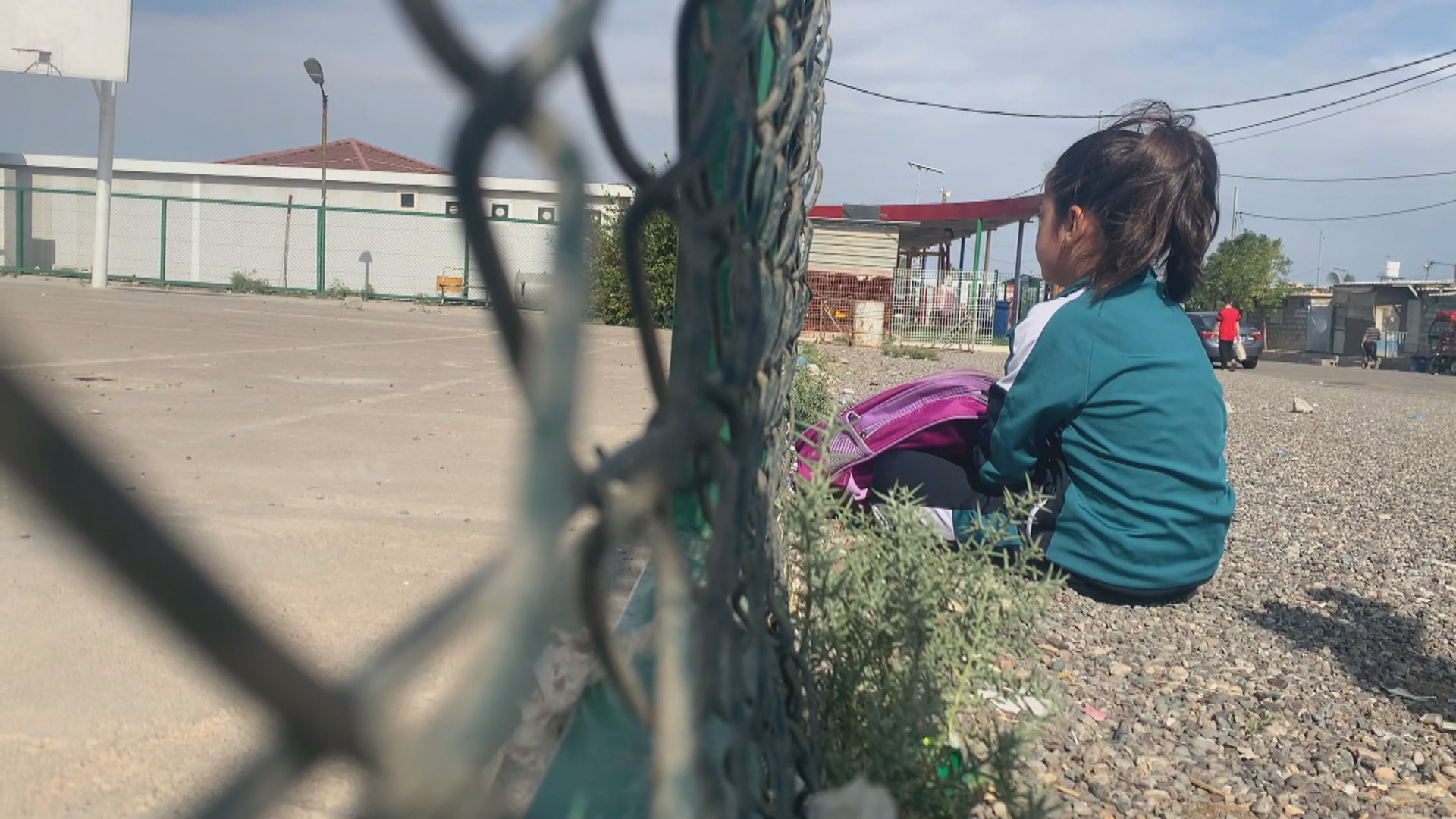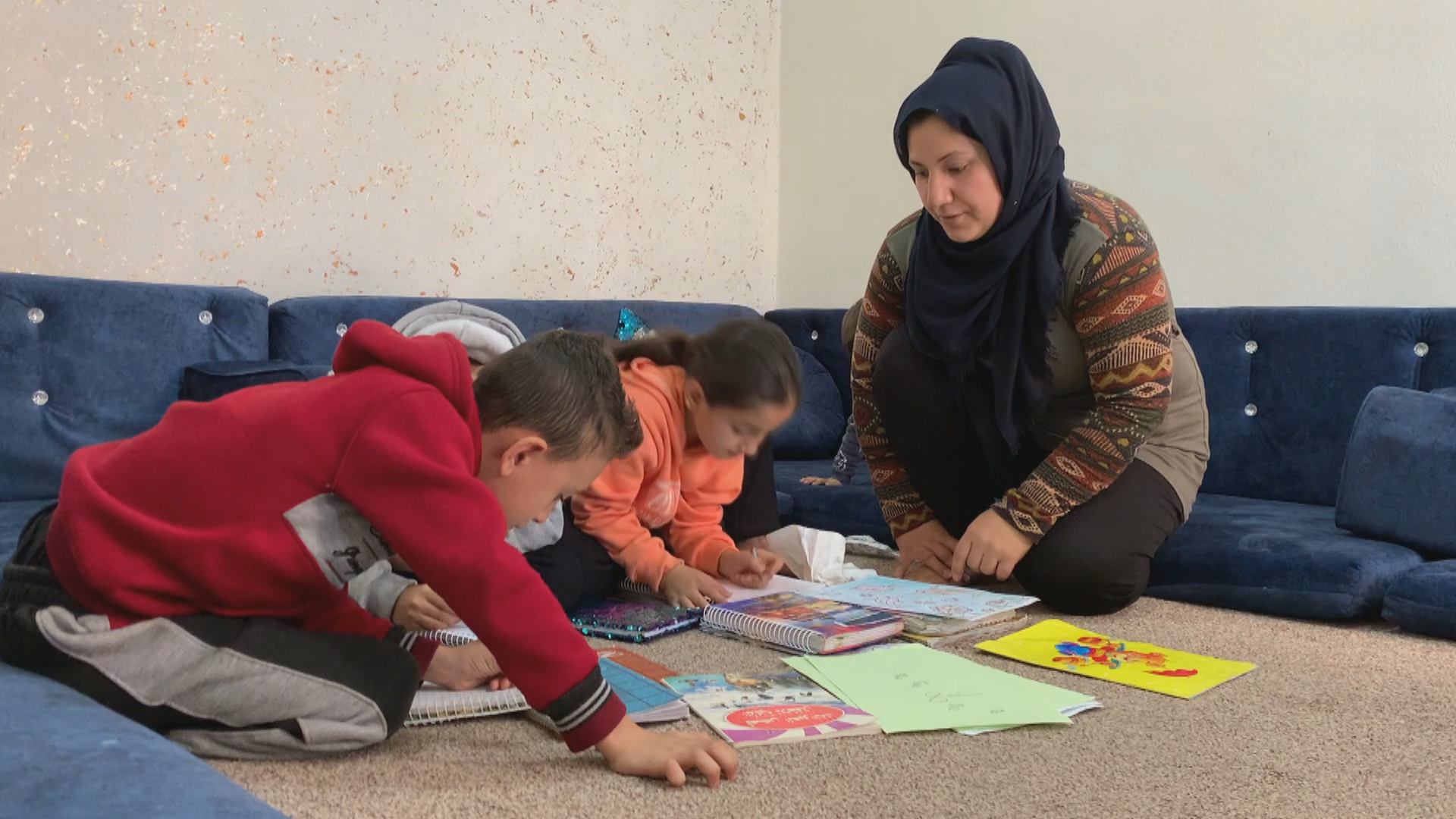Kurdistan


Qamishli basic school at Qushtapa camp in Erbil province. Date: December, 2021. Photo: Rudaw
prev
next
ERBIL, Kurdistan Region - Nearly three months after the opening of schools in the Kurdistan Region, students from northeast Syria (Rojava) in the Region remain without education for the current academic year as their teachers continue their boycott due to unpaid salaries.
According to official figures, nearly 250,000 Syrians live in the Kurdistan Region, most of whom fled the unrest at home which began in 2011. The United Nations Children's Fund (UNICEF) paid the teachers $250 per month until 2019. Since then, the Kurdistan Regional Government (KRG) has paid them a similar salary for some months.
Two weeks after the new academic year began in the Kurdistan Region in mid-September, Kurdish teachers of Rojava schools at refugee camps went on strike, demanding the payment of their salaries.
There are 1,100 Rojava teachers who teach 38,000 students in 57 schools in the Kurdistan Region, according to the Rojava Teachers Union which works to protect the rights of teachers. The schools have a different curriculum than the one taught in other schools in the Region.
All 55 teachers are on strike at Qamishli basic school in Erbil province's Qushtapa camp.
This year was Amina Mustafa’s first year at school but she was able to go there only for two weeks. She has been waiting for her school to reopen for nearly three months in vain. She carries her bag every day and heads to school before realising that it is closed. She is already one year behind because she could not go to school last year as her father suffered from cancer and died.
Narmin Mohammed scored the highest mark in her school in Qushtapa during the 2019-2020 academic year. She is in her last stage of high school now and wants to become a doctor if she can pursue her studies. “We did our best to complete the curriculum so that we could easily pass,” she told Rudaw on Tuesday.
Hamrin Hassan has been teaching at the school in Qushtapa camp for seven years but she told Rudaw that she could hardly make ends meet.
“We have been living here for seven years. Our salary is so low that it does not cover our costs,” she said, adding that they do not know what they are as there is no official recognition of their employment.
Some parents have decided to homeschool their children.
“I teach my children at home. Not everyone has this chance because they are not all educated,” said Sawriya Ibrahim.
The strike has affected almost all Rojava schools in the Region.
Teachers like Marwan Hanosh have found new jobs for themselves. He has begun working as a labourer.
Alan Hama Said KRG education minister told Rudaw in October that the government paid four salaries to these teachers to cover January to April, adding that “We will continue paying their financial entitlements.”
Sharifa Ramo has been teaching English to students at Qushtapa camp’s Qamishli school. “They are our children and those of our relatives and neighbours,” she told Rudaw’s Dilbxwin Dara on Tuesday, adding that they are against the boycott but do not have better choices.
Haji Afrini is the head of the Rojava Teachers Union. He said they have contacted UNICEF several times but the agency has said they are no longer responsible for refugee camps.
“Students outside the schools could face any bad things but they and their future can be protected in classrooms,” warned Afrini.
Rudaw reached out to UNICEF and the KRG’s education ministry for a comment but they were not available.
KRG has been suffering from a financial crisis since 2014 due to several reasons, including the dramatic drop in oil prices and cutting of its budget from Baghdad. It has failed to pay its civil servants on time and in full for years.
Reporting by Halabja Saadun from Qushtapa camp
According to official figures, nearly 250,000 Syrians live in the Kurdistan Region, most of whom fled the unrest at home which began in 2011. The United Nations Children's Fund (UNICEF) paid the teachers $250 per month until 2019. Since then, the Kurdistan Regional Government (KRG) has paid them a similar salary for some months.
Two weeks after the new academic year began in the Kurdistan Region in mid-September, Kurdish teachers of Rojava schools at refugee camps went on strike, demanding the payment of their salaries.
There are 1,100 Rojava teachers who teach 38,000 students in 57 schools in the Kurdistan Region, according to the Rojava Teachers Union which works to protect the rights of teachers. The schools have a different curriculum than the one taught in other schools in the Region.
All 55 teachers are on strike at Qamishli basic school in Erbil province's Qushtapa camp.
This year was Amina Mustafa’s first year at school but she was able to go there only for two weeks. She has been waiting for her school to reopen for nearly three months in vain. She carries her bag every day and heads to school before realising that it is closed. She is already one year behind because she could not go to school last year as her father suffered from cancer and died.
Narmin Mohammed scored the highest mark in her school in Qushtapa during the 2019-2020 academic year. She is in her last stage of high school now and wants to become a doctor if she can pursue her studies. “We did our best to complete the curriculum so that we could easily pass,” she told Rudaw on Tuesday.
Hamrin Hassan has been teaching at the school in Qushtapa camp for seven years but she told Rudaw that she could hardly make ends meet.
“We have been living here for seven years. Our salary is so low that it does not cover our costs,” she said, adding that they do not know what they are as there is no official recognition of their employment.
Some parents have decided to homeschool their children.
“I teach my children at home. Not everyone has this chance because they are not all educated,” said Sawriya Ibrahim.
The strike has affected almost all Rojava schools in the Region.
Teachers like Marwan Hanosh have found new jobs for themselves. He has begun working as a labourer.
Alan Hama Said KRG education minister told Rudaw in October that the government paid four salaries to these teachers to cover January to April, adding that “We will continue paying their financial entitlements.”
Sharifa Ramo has been teaching English to students at Qushtapa camp’s Qamishli school. “They are our children and those of our relatives and neighbours,” she told Rudaw’s Dilbxwin Dara on Tuesday, adding that they are against the boycott but do not have better choices.
Haji Afrini is the head of the Rojava Teachers Union. He said they have contacted UNICEF several times but the agency has said they are no longer responsible for refugee camps.
“Students outside the schools could face any bad things but they and their future can be protected in classrooms,” warned Afrini.
Rudaw reached out to UNICEF and the KRG’s education ministry for a comment but they were not available.
KRG has been suffering from a financial crisis since 2014 due to several reasons, including the dramatic drop in oil prices and cutting of its budget from Baghdad. It has failed to pay its civil servants on time and in full for years.
Reporting by Halabja Saadun from Qushtapa camp









Comments
Rudaw moderates all comments submitted on our website. We welcome comments which are relevant to the article and encourage further discussion about the issues that matter to you. We also welcome constructive criticism about Rudaw.
To be approved for publication, however, your comments must meet our community guidelines.
We will not tolerate the following: profanity, threats, personal attacks, vulgarity, abuse (such as sexism, racism, homophobia or xenophobia), or commercial or personal promotion.
Comments that do not meet our guidelines will be rejected. Comments are not edited – they are either approved or rejected.
Post a comment